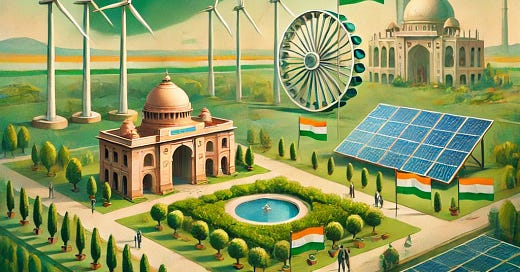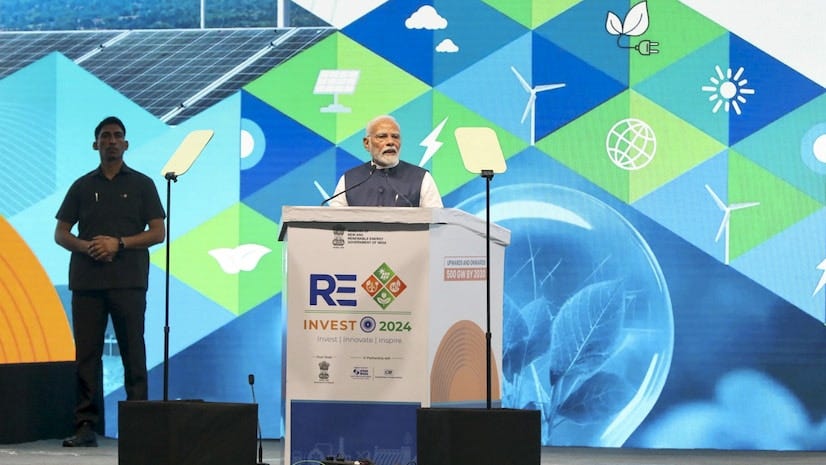PM's Clarion Call for a Green Energy Revolution
India’s Renewable Energy Push at RE-INVEST 2024, Gandhinagar, Gujarat. "India is the first G20 nation to achieve the Paris climate goals nine years ahead of schedule."
India's Ambitious Renewable Energy Push: RE-INVEST 2024
Prime Minister Narendra Modi inaugurated the 4th Global Renewable Energy Investor's Meet and Expo (RE-INVEST) in Gandhinagar, Gujarat, marking a major milestone in India's renewable energy journey. The 3-day summit, to be held from September 16-18, 2024, attracted leaders, investors, and innovators from around the world to discuss India’s progress and the way forward in renewable energy.
PM Modi’s Inaugural Speech Highlights
Prime Minister Modi underscored India's success in renewable energy and its ambitious future goals. He highlighted India's growing role as a leader in green energy and proudly stated that "India is the first G20 nation to achieve the Paris climate goals nine years ahead of schedule."
India’s Climate Leadership: Ahead of the Paris Agreement Goals
Prime Minister Modi's proud claim that India is the first G20 nation to achieve its Paris climate commitments nine years ahead of schedule is a significant assertion, particularly in the global context. India’s achievements include sourcing over 40% of its power capacity from non-fossil fuel sources, reducing emissions intensity by 45% from 2005 levels, and expanding its forest cover to create additional carbon sinks. These accomplishments align with India's Nationally Determined Contributions (NDCs) under the Paris Agreement and reflect the country’s commitment to sustainable development.
India in the Global Climate Landscape
While India’s progress is commendable, a comparative analysis with other major economies offers valuable insights. The United States, after rejoining the Paris Agreement under President Biden, is currently behind on its target to reduce emissions by 50-52% by 2030. China, the world’s largest emitter, aims to peak carbon emissions before 2030 and achieve carbon neutrality by 2060, but faces ongoing challenges. Meanwhile, the European Union is working towards an ambitious 55% reduction in emissions by 2030 but also confronts difficulties in reaching its targets. India's success stands out in this global context, although the future challenges of balancing economic growth with sustainability will be a key factor in maintaining its leadership.
India’s Key Initiatives
Key initiatives mentioned included:
PM Surya Ghar Muft Bijli Yojana: A scheme enabling every Indian household to produce its own solar power.
Mission 500 GW: A commitment to reach 500 GW of renewable energy capacity by 2030.
Green Hydrogen: India's leadership in green hydrogen through the Green Hydrogen Mission.
PM Modi emphasised that renewable energy in India is no longer just a goal but a reality in motion, with over 200 GW of installed non-fossil fuel capacity already achieved.
Background and Objectives
The RE-INVEST summit, which began in 2015, has grown into a significant event for the renewable energy sector. The 2024 edition is themed "Mission 500 GW," reflecting India’s ambitious target of expanding its renewable energy capacity.
Key objectives include:
Showcasing India's renewable energy potential.
Attracting global investments.
Promoting technological innovation.
Strengthening international collaboration.
India’s Progress in Renewable Energy
India has made substantial advancements in renewable energy. Prime Minister Modi highlighted the following achievements:
200 GW of Installed Non-Fossil Fuel Capacity: A testament to India's rapid progress in building renewable energy infrastructure.
Climate Leadership: As the first G20 nation to meet Paris Climate Agreement commitments, India demonstrates its leadership on the global stage.
Rooftop Solar: Through the PM Surya Ghar scheme, households have become power producers, with over 1.3 crore families already registered.
Renewable Energy as a People’s Movement
Modi stressed that India’s renewable energy transition is a people-driven movement. Initiatives like the PM Surya Ghar Muft Bijli Yojana empower households to generate solar energy, transforming citizens into active participants in the green revolution. With over 3.25 lakh installations completed, the initiative not only reduces household energy costs but also fosters local employment, potentially creating 20 lakh jobs, especially in solar PV installation and maintenance. This grassroots involvement underscores the collective effort to meet India’s climate goals.
Challenges Facing Renewable Energy in India
Despite impressive progress, several challenges remain as India moves toward its 500 GW target:
Grid Integration: Managing the integration of variable renewable energy sources like solar and wind into the national grid is complex.
Land Acquisition: Securing land for large-scale solar and wind projects, especially in densely populated regions, poses significant challenges.
Storage Solutions: Cost-effective energy storage is vital for managing the intermittency of renewable power, and scalable solutions are still in development.
Financing: Achieving 500 GW of renewable energy by 2030 will require massive capital investments, estimated in trillions of dollars.
Skilled Workforce: Developing a specialised workforce is crucial to support the rapid expansion of the renewable energy sector.
International Collaboration
The RE-INVEST 2024 summit features participation from key partner countries, including Germany, Australia, Denmark, and Norway. International collaboration is critical for sharing technological innovations, securing investments, and advancing India’s renewable energy agenda.
Innovative Initiatives
The Indian government has introduced several innovative schemes and policies aimed at achieving its renewable energy targets:
Solar Cities: Cities like Ayodhya are being developed as solar-powered models, with all energy needs met through solar power.
Green Hydrogen: Supported by a substantial budget under the Green Hydrogen Mission, this initiative will help reduce India’s carbon footprint.
Waste-to-Energy Projects: These projects aim to convert urban waste into clean energy, addressing both waste management and energy generation needs.
India’s Renewable Energy and Electric Vehicle Synergy
As of 2024, renewable energy accounts for approximately 22% of India’s total energy mix, including solar, wind, biomass, and small hydro projects. Looking ahead, India aims to increase its renewable energy capacity to 500 GW by 2030, representing about 50% of its total energy consumption and aligning with its COP26 commitment.
A crucial component of this transition is the focus on electric vehicles (EVs). By 2030, India aims for EVs to constitute 30% of private cars, 70% of commercial vehicles, and 80% of two and three-wheelers. These efforts reduce fossil fuel dependence in the transportation sector, a significant contributor to carbon emissions. Integrating renewable energy into EV charging infrastructure, such as solar-powered charging stations, will ensure that EVs are powered by clean energy, creating a synergy between renewable energy and electric mobility.
The Road Ahead: Challenges and Opportunities
While India’s renewable energy progress is commendable, achieving the 500 GW target by 2030 will require continuous innovation and significant investment. There are opportunities in emerging sectors like offshore wind, green hydrogen, and electric mobility, but public and private sector collaboration, along with international support, will be essential.
However, challenges such as developing advanced grid infrastructure, securing sustainable land solutions, and mobilising global investment must be addressed. Investment in human capital, through education and skill development, will also be crucial for meeting the sector's growing demands.
Looking Ahead: A Green Future Beckons
India’s leadership in renewable energy reflects its vision for a sustainable future. The RE-INVEST 2024 summit highlights the nation’s potential to meet its energy needs sustainably and set an example for the world. As Prime Minister Modi aptly noted, "India’s solar revolution will be written in golden letters in the history of the 21st century."
With ongoing international collaboration and domestic innovation, India is well-positioned to lead the global renewable energy transition while ensuring its own energy security and fostering economic growth.





